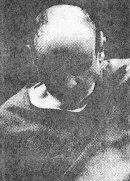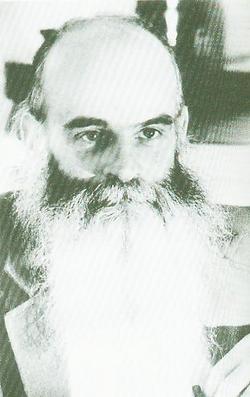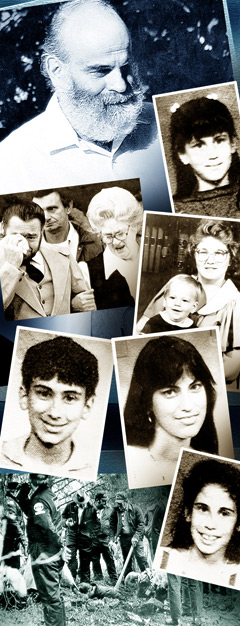


Executed June 25, 1990 by Lethal Injection in Arkansas



11th murderer executed in U.S. in 1990
131st murderer executed in U.S. since 1976
2nd murderer executed in Arkansas in 1990
2nd murderer executed in Arkansas since 1976
(Race/Sex/Age at Murder-Execution) |
Birth |
(Race/Sex/Age at Murder) |
Murder |
Murder |
to Murderer |
Sentence |
||||
| |
Ronald Gene Simmons W / M/ 47 - 49 |
Gene Simmons Rebecca Simmons Barbara Simmons, 3 Loretta Simmons, 17 Eddy Simmons Marianne Simmons Becky Simmons Billy Simmons Renata Simmons Trae Simmons Sheila McNulty Dennis McNulty Sylvia Gail Simmons Michael Simmons Kathy Kendrick, 24 J.D. Chaffin, 33 |
12-22-87 12-22-87 12-22-87 12-22-87 12-22-87 12-22-87 12-26-87 12-26-87 12-26-87 12-26-87 12-26-87 12-26-87 12-26-87 12-28-87 12-28-87 |
Handgun Strangulation Strangulation Strangulation Strangulation Strangulation Handgun Handgun Drowning Handgun Handgun Strangulation Strangulation Handgun Handgun |
Wife Daughter Daughter Son Daughter Daughter Son Daughter in Law Grandson Daughter Son in Law Daughter/ Granddaughter Grandson None None |
|
 Ronald Gene Simmons (top) killed a total of 16 people, of which 14 were family members, including his children Rebecca, Loretta, Marianne and Eddie (in snapshots).
Ronald Gene Simmons (top) killed a total of 16 people, of which 14 were family members, including his children Rebecca, Loretta, Marianne and Eddie (in snapshots).
Citations:
Franz ex rel. Simmons v. State, 754 S.W.2d 839 (Ark. 1988).
Internet Sources:
The Mass Murder Website: Ronald Gene Simmons
Just before Christmas 1987, Russellville, Arkansas, Ronald Gene Simmons made a conscious decision to kill all the members of his family. On the morning of 22 December he first bludgeoned and shot his son Gene and his long-suffering wife Rebecca; then he strangled his three-year-old daughter Barbara. After having a beer, Simmons dumped the bodies in the cesspit he had made his children dig. Now Simmons sat back and awaited the return of his other children. When they arrived off the bus he said he had presents for them but wanted to give them one at a time. First to receive her ‘gift’ was eldest daughter, seventeen-year-old Loretta, who Simmons strangled and held under the water in the rain barrel. The three other children, Eddy, Marianne and Becky were dispatched in a similarly callous manner.
Around midday on 26 December, the remaining members of the family arrived for their planned Christmas visit; it was to be their last Christmas. The first to die was Simmons’ son Billy and daughter-in-law Renata, both shot dead; then his grandson Trae was strangled and drowned; then daughter Sheila and her husband Dennis McNulty were shot. Ronald Simmons’ child by his own daughter, christened Sylvia Gail, was strangled, and finally grandson Michael. Simmons laid the bodies of his whole family in neat rows in the lounge. All the corpses were covered with coats except that of Sheila, who was laid in state covered by Mrs Simmons’ best tablecloth. The bodies of the two grandsons were wrapped in plastic sheeting and left in abandoned cars at the end of the lane. After popping out for a drink in a local bar Simmons returned to the house and, apparently oblivious of the corpses lined up around him, spent the next two nights and the Sunday drinking beer and watching television.
On the Monday morning Ronald Simmons drove into Russellville and at a law office shot dead a young woman named Kathy Kendrick, who for some reason he blamed for many of his problems. Next stop on his murderous tour was an oil company office where Simmons shot dead a man named J.D Chaffin and wounded the owner. He then drove on to a store where he shot and wounded two more people. Now on to another office where he shot and wounded a woman. And that was the end of his killing spree. Simmons simply sat in the office and chatted to one of the secretaries while waiting for the police. When they arrived he handed over his gun and surrendered without any resistance.
Simmons was charged with sixteen counts of murder, found guilty and sentenced to death. On 31 May Arkansas governor (later president) Bill Clinton signed Simmons execution warrant, and on 25 June 1990 he died, as he had chosen to do, by lethal injection.
The Wacky World of Murder: Ronald Gene Simmons
"You have destroyed me, and you have destroyed my trust in you . . . I will see you in Hell." (Taken from a letter written to his daughter after she reported him for molesting her.)
BORN : ??
DIED : June 25, 1990
VICTIMS : 16
Simmons was well known in his town, Cloudcroft, New Mexico. He was someone most people feared. "He had a beer in his hand all the time. He had one little room he would stay in all the time. It was dark and seemed spooky, and it stunk," said a friend of his daughters. In 1981 Simmons and his family fled town when he was reported for having sex with his daughter. He was seen giving her more than friendly kisses good-bye each morning and eventually she admitted she was pregnant with his baby. Charges were filed, but eventually dropped as the Simmons family disappeared. They surfaced in Russellville, Arkansas. His wife attempted to leave him on numerous occasions, but always returned. It would seem she made one too many attempts.
On December 22, 1987 Simmons went out to the local Wal-Mart and bought a .22 caliber handgun (you gotta love the US gun laws). He then went home and beat, then shot his wife and son, Gene. He then strangled his 3-year-old daughter. Once he'd had a beer he dumped the bodies in a cess-pit in the backyard (he had ordered his kids dig the hole days before). When his other children arrived home he told them he had a present for each, but had to give them one at a time. Loretta, 17, was first to get her present. She was beaten, strangled, then drowned in a rain barrel (whatever that is). He then gave very similar presents to the remaining children Eddy, Marianne and Becky.
On December 26 Simmons eldest son, Billy, and his wife arrived for a christmas visit with their son, Trae. Their bodies were found with the rest. The adults had been shot, the child drowned. Later in the day Simmons favorite daughter Sheila and her husband arrived with their child. Michael, and Simmon's own child (the one his daughter had), Sylvia. Once again the adults were shot and the kids were drowned. All these bodies were then lined up in the lounge room of Simmons house, and stayed that way for days.
A few days later Simmons drove into town and found Kathy Kendrick, 24, who had earlier ignored his come-ons. He shot her. He then met up with James D. Chaffin, 33, who he worked with. He killed him too. He went into a Mini mart and shot another woman (this one survived), then found another ex-workmate and shot her as well (she also survived). Simmons was eventually arrested and his family were found.
Simmons pleaded for the death sentence at his first trial (for the final two murders), and got it. And at his second trial (for his family) he attacked the prosecutor, punching him in the face, and attempted to grab a deputy's handgun. This took place as the jury were about to go into deliberation. Not a good thing to have in their minds just before they were about to decide on his life. He received a heap more death sentences. He was executed by lethal injection on June 25, 1990.
INTERESTING BITS:
For some bizarre reason he soaked the bodies in kerosene, he said he believed that it would stop the smell coming out of the ground and attracting animals and people.
Simmons's death warrant was signed by Bill Clinton.
While on Death Row Simmons had to be separated from other prisoners as his life was threatened constantly. This was because he refused to appeal his death sentence. The other prisoners believed Simmons was damaging their chances of beating their own death sentence. "To those who oppose the death penalty in my particular case, anything short of death would be cruel and unusual punishment." (Simmons statement before the court at his first trial.)
After Simmons had a stay of execution put in place the local Sheriff showed his concern for human life: "I'm angry that a country such as we live in can go through with this kind of thing, I had hoped our U.S. Supreme Court judges would have a little more sense than to listen to some cockeyed death row inmate."
May 7, 1998 - Ronald Gene Simmons, the hillbilly from hell, allegedly was the father of his daughter's son. In Christmas, 1987, he killed his whole family after his wife threatened him with divorce. Gene killed fourteen members of his inbred clan making him one of the most efficient family annihilators. When he was arrested for two other unrelated murders, the police sensed something suspicious about the way he talked about his family. When they went to his property they discovered the bunch of them dead. (Source: Crimes And Punishment: The Illustrated Crime Encyclopedia)
Ronald Gene Simmons killed 14 members of his family during Christmas week in 1987. He was sentenced to death, said he was willing to die, and refused to appeal. But his scheduled March 16, 1989 execution was delayed when a fellow inmate, also on death row, persuaded the Supreme Court to block it (while Simmons was having what he expected to be his last meal) on the grounds that the execution could have repercussions for other death-row inmates. It took the Court until April 24th of this year to reject that challenge. Simmons was executed on June 25th.
Whitmore ex rel. Simmons v. Arkansas, 110 S.Ct. 1717 (1990).
On December 28, 1987, Ronald Gene Simmons shot and killed two people and wounded three others in the course of a rampage through the town of Russellville, Arkansas. After police apprehended Simmons, they searched his home in nearby Dover, Arkansas, and discovered the bodies of 14 members of Simmons' family, all of whom had been murdered. The State filed two sets of criminal charges against Simmons, one based on the two Russellville murders and the other covering the deaths of his family members.
Simmons was first tried for the Russellville crimes, and a jury convicted him of capital murder and sentenced him to death. After being sentenced, Simmons made this statement under oath: " 'I, Ronald Gene Simmons, Sr., want it to be known that it is my wish and my desire that absolutely no action by anybody be taken to appeal or in any way change this sentence. It is further respectfully requested that this sentence be carried out expeditiously.' " The trial court conducted a hearing concerning Simmons' competence to waive further proceedings, and concluded that his decision was knowing and intelligent.
As Simmons' execution date approached Louis J. Franz, a Catholic priest who counsels inmates at the Arkansas Department of Corrections, petitioned the Supreme Court of Arkansas for permission to proceed as Simmons' "next friend" and to prosecute an appeal on his behalf. The court held that Franz did not have standing as "next friend," because he had not alleged facts showing that he had ever met Simmons, much less that he had a close relationship with the defendant. It also rejected both his argument for standing under the Arkansas Constitution as an aggrieved taxpayer and his assertion that he should have standing as a concerned citizen to prevent an important legal issue from going unresolved at the appellate level. In dicta, the court went on to state that Arkansas law does not require a mandatory appeal in all death penalty cases.
Franz and another Arkansas death row inmate, Darrel Wayne Hill, then applied in Federal District Court for a writ of habeas corpus to prevent Simmons' execution, but the petition was denied on the ground that Franz and Hill did not have standing.
The State subsequently tried Simmons for the murder of his 14 family members, and on February 10, 1989, a jury convicted him of capital murder and imposed a sentence of death by lethal injection. Simmons again notified the trial court of his desire to waive his right to direct appeal, and after a hearing, the court found Simmons competent to do so. The Supreme Court of Arkansas, pursuant to the rule established in Franz, reviewed the competency determination and affirmed the trial court's decision that Simmons had knowingly and intelligently waived his right to appeal.
Three days later, petitioner Jonas Whitmore, another death row inmate in Arkansas, sought permission from the Supreme Court of Arkansas to intervene in Simmons' proceeding both individually and "as next friend of Ronald Gene Simmons." The court concluded that Whitmore had failed to show he had standing to intervene, and it denied the motion. Simmons v. State, 298 Ark. 255, 766 S.W.2d 423 (1989). Whitmore then asked this Court to stay Simmons' execution, which was scheduled for March 16, 1989.
New England Journal on Criminal and Civil Confinement, Winter/Summer, 1992 - Case Comment: WHITMORE v. ARKANSAS: EXECUTION OF AN INDIVIDUAL, WITHOUT A PRIOR MANDATORY APPELLATE REVIEW, DENIED SCRUTINY, by Carol A. Fitzsimmons.
On December 28, 1987, in the Town of Russellville, Arkansas, Ronald Gene Simmons went on a murderous rampage at four different locations over a period of approximately thirty minutes. During this violent spree, Simmons shot five people, seriously injuring three and killing two. Simmons was later apprehended and a search of his home was conducted, in which more dead bodies, later identified as family members, were discovered.
As a result of these findings, the State of Arkansas filed criminal charges in two counties against Ronald Gene Simmons. On May 16, 1988, in the Circuit Court of Franklin County, a jury convicted Simmons of capital murder and sentenced him to death for the murders of the two innocent bystanders during the rampage through the Town of Russellville. With respect to this conviction, Simmons made the trial court aware that he did not wish to seek any direct appeal to the Arkansas Supreme Court for the purpose of reviewing the validity of his conviction for capital murder. In response to this request, the Franklin County Circuit Court held a hearing on May 16, 1988, at which time experts testified as to "Simmons' mental competence to make a voluntary waiver of his right to a direct appeal to the Arkansas Supreme Court." Upon hearing such testimony, the trial court concluded that Ronald Gene Simmons was sufficiently competent to voluntarily waive his right to direct appeal and that his choice to do so was made knowingly and intelligently.
Subsequently, on February 10, 1989, Ronald Gene Simmons was tried in the Circuit Court of Johnson County for the murders of the fourteen members of his family, whose bodies were discovered December 28-29, 1987. The jury convicted Simmons of capital murder and sentenced him to death by lethal injection to be carried out on March 16, 1989 at 7:00 a.m. Following the trial, Simmons notified the trial judge of his desire to waive his right to appeal. An evidentiary hearing was held on March 1, 1989, and the trial judge found that Simmons was again competent to waive his right to direct appeal. The Arkansas Supreme Court, pursuant to the rule established in Franz v. State, reviewed the competency evaluation and subsequently affirmed the trial court's decision that Simmons had made a knowing and intelligent waiver of his right to appeal. Although the Arkansas Supreme Court has affirmed Simmons' right to waive appeal, the execution scheduled for March 16, 1989, has yet to be carried out. Two individuals, Reverend Louis Franz and Jonas Whitmore sought review of this sentence both individually and as "next friend" to Ronald Gene Simmons.
Amazon.Com
"Zero at the Bone: The True Story of the Ronald Gene Simmons Christmas Massacre," by Paul Williams and Bryce Marshall.
Holidays Of Horror
Simmons went crazy
Murdered sixteen
Fourteen of them family
He killed them
For the holidays
Merry Christmas
He gunned his family down
His bullets were their presents
Dead relatives all around
Happy New Year
One they won't be here to see
It's the holiday of horror
Because of Ronald Gene Simmons
He built a wall
Around his trailer home
So the neighbours would leave him alone
And he didn't want them to see
How he abused his family
Merry Christmas
He gunned his family down
His bullets were their presents
Dead relatives all around
Happy New Year
One they won't be here to see
It's the holiday of horror
Because of Ronald Gene Simmons
(All lyrics by Macabre)
"Family Annihilation," by Tom Zoellner. (April 22, 2001)
The perpetrator of family annihilations frequently commits suicide after the initial act of violence, academics said. But not every case fits that mold. Occasionally, the killer survives:
Ronald Gene Simmons killed 16 members of his extended family in Russellville, Ark., over a course of three days at Christmas 1987. Between the murders he drank beer and watched television. His daughter had recently embarrassed him by revealing that he was the father of her child. He was executed in 1990.